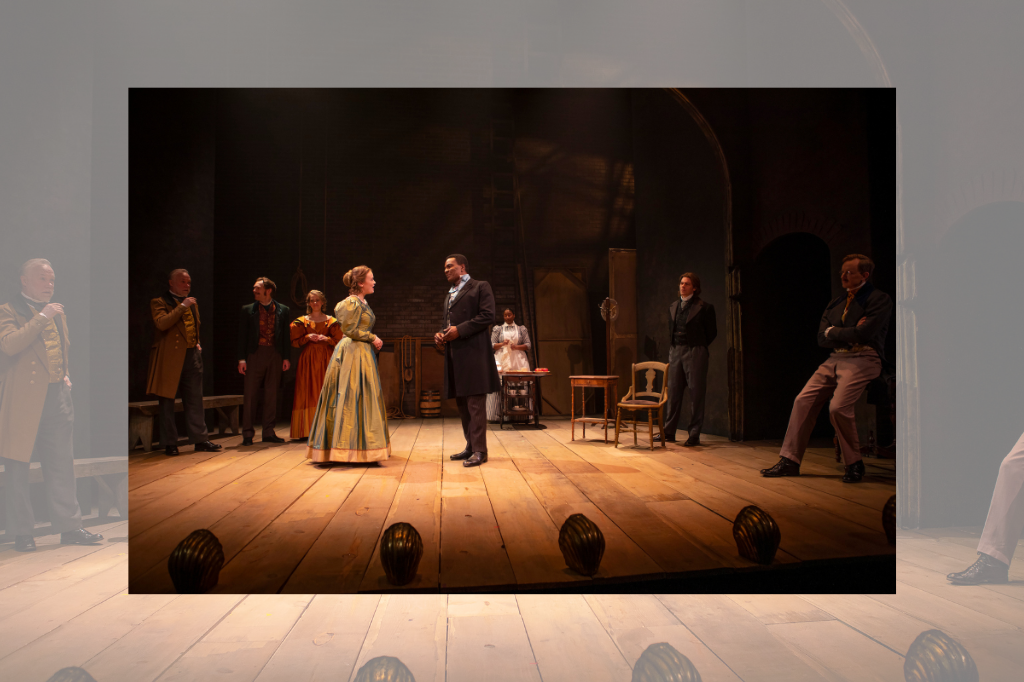REVIEW: Red Velvet at Crow’s Theatre
Being a trailblazer is always difficult, especially if the trail is purposefully blocked by gatekeepers.
Ira Aldridge may be one of the greatest actors you’ve never heard of. As the British political establishment perched on the cusp of outlawing slavery in 1833, he became the first Black actor to perform a major role on a London stage. Before his Othello, even Shakespeare’s most famous Black role…simply wasn’t. Though audiences took to him in London, a critical establishment stuck in its ways caused Aldridge to leave the city, the way the New York-born actor had previously left hostilities in America, for more enlightened attitudes elsewhere in Europe. He would go on to have a lengthy, illustrious career.
In Crow’s Theatre’s production of Lolita Chakrabarti’s lyrical, gut-punching Red Velvet, an accomplished cast comes together to support Allan Louis’ star-making portrayal of the actor in two and a half hours that feel like the blink of an eye.
Chakrabarti’s “imagined version of true events” is less a life story than a bookending, focusing on this watershed early moment in Aldridge’s career and that career’s conclusion. When we meet Aldridge, we see a dignified, powerful 60-year-old man who has triumphed over the naysayers. He is slowing with some kind of mysterious illness, but still summons the fire within to play to full, eager European halls. A young, canny Polish journalist, Halina Wozniak (Amelia Sargisson), promising a German-speaking stagehand (Nathan Howe) a tryst, sneaks in to see the interview-shunning thespian for what will hopefully be a scoop of a lifetime. Aldridge seems to enjoy a short trip down memory lane, reminiscing about his favourite, most genuine audiences, but we see the sleeping lion awake when Wozniak refuses to back down from questions about his early history. Why has he never been back to play Covent Garden?
Louis is a dynamo at both ages, visibly shedding the years as we are transported back to the Theatre Royal decades ago. When venerable British actor Edmund Kean falls ill and is not expected to act again, his foppish, entitled son Charles (a delightfully hammy Jeff Lillico, whose gleefully overacted Iago goes over the top and then some) assumes that the show must go on under his mantle. Instead, company leader Pierre Laporte (Kyle Blair) provides a shocking alternative: Aldridge, a friend and already a success in the provinces, will go on as the Moor.
The most striking aspects of Chakrabarti’s script are its gorgeous, rich turns of phrase and its relentlessly topical nature. When not playing with metaphor or carefully layering in a meaningful moment from Othello, she pokes fun at foibles and attitudes that are equally relevant in 2022 as in 1833 with quickly-paced quips and backstage gossip. Sargisson’s simpering actress Betty Lovell (her nervous giggle is a thing of beauty) engages in useless minor slavery-related boycotts more out of keeping in fashion than genuine political conviction, not fully able to treat the company’s Jamaican servant Connie (Starr Domingue) like a human being.
Older actor Bernard Warde (an excellent Patrick McManus) believes that Brits are forever set in their ways, liking what they like, and it’s better to feed the beast than be consumed by it. A derisive remark about the particularly fossilized nature of the matinee audience sent waves of laughter through our own matinee. And, in a spasm of outrage, Kean shudders over the horrific potential end of all of this new “enlightened” casting: the theatre might – gasp – become “accessible.”
At the same time, others in the company form fledgling bonds with Aldridge, making the inevitable letdown even more heartbreaking as the damning reviews pile up and the board revolts. Young semi-revolutionary Henry Forrester (Nathan Howe) at first sees the symbolism before the man, delighting in the shocked reaction of some of his compatriots to Aldridge’s countenance. However, he soon extends a hand to the thespian “hero” in the hope that, with Aldridge at the forefront, the company can truly be part of something meaningful. As well, the budding acting partnership and sexual tension between Aldridge and his Desdemona Ellen Tree (Ellen Denny), who stands up to paramour Charles Kean, feels like the potential start of something magical.
Cherissa Richards’ elegant direction gives the production a Shaw Festival-like polish, an impression aided by veterans of the company. Cast members handle double or triple-casting fluidly, orbiting around the magnetic barycentre of Louis’ performance, which he alternately delivers with stentorian grace, mischievous sparkle, or simmering rage.
In Julie Fox’s attractive set design, Crow’s Theatre is transformed into, well, a theatre. A grand one: enormous, sumptuous red velvet curtains form a portrait-like frame, with gilded clamshell footlights adorning the forestage. The actors handily manipulate antique- and dusty-looking wooden furniture to go from dressing room to rehearsal hall to back alley, leading to lively scene changes. Even when the characters are offstage, the play implies, they are always on a stage of some kind, none moreso than Aldridge, whose every behaviour and acting choice is scrutinized, analyzed, and seized upon by critics and some castmates as evidence of a possible inferiority or savagery.
In that vein, a moment sticks out: when Connie comes out of her shell for a minor tete-a-tete with Aldridge, the Black characters the only ones on stage, the mood effectively shifts to one of relaxation in a contrast that hammers home the ever-present tension in the rest of the play. Domingue’s plain disbelief and blunt commentary are refreshing in a world of declaiming actors for the brief conversation before the masks must go back on.
And go back on they must: for while some remain steadfast to Aldridge’s cause, most, sensing their own precarious acceptance in danger, do not. Perhaps the most crushing, wrenching moment is when Chakrabarti draws the line over which allyship breaks down, when Laporte tells Aldridge his triumph has become a tragedy. Patience stretched thin and his own neck on the line, Blair still plainly telegraphs Laporte’s love for Aldridge, gripping his arm with desperation. That even this love is not enough for the manager to choose righteousness over economics makes his plea on behalf of respectability politics and careful, incremental change more painful than any sneering newspaper headline.
His accusation that Aldridge should have “played it safe” hangs in the air like specks of dust obscuring the limelight. The play’s question is clear: If Aldridge had chosen safety, would anything have changed from the establishment’s response, in a world where being the best is not enough?
Progress is a never-ending goal, and often cyclic, rather than linear. The cycle must begin again: as the torch of the spotlight once passed from Kean to Aldridge, we see another civil rights revolution on the horizon in the play’s present, with the fiery Wozniak and her claim that she is the only woman in the newsroom. Yet progress also comes at a price: in a passionate ending that might leave you breathless, we see that the scars of past rejections never completely heal.
Aldridge calls the allure of red velvet “a deep promise of what’s to come.” In this beautiful play, we see the eventual result of that promise to one man, while wondering whether theatre’s promise as a truly progressive force will ever be fulfilled.
But at least we know the name Ira Aldridge.
Red Velvet ran at Crow’s Theatre November 22 through December 18, 2022.















Comments